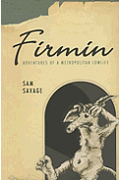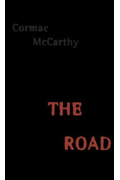
The Morning News Tournament of Books, sponsored by Powell’s Books, is an annual battle royale amongst the top novels in “literary fiction” published throughout the year. Read more about this year’s tournament »
» Buy the Books at Powells.com «
» Meet This Year’s Judges «
» Check the Bloggers’ Office Pool «
» Relive the Action: 2006, 2005 «
» Contact the Tournament Staff «
• ROUND TWO • MATCH TWO •
March 21, 2007
 |
Firminby SAM SAVAGE |

|
| v. | ||
The Roadby CORMAC McCARTHY |
judged by MARK SARVAS
When one turns one’s attention to the great narrators of literature, there aren’t a lot of animals to be found. There’s probably a reason Cervantes didn’t give us a chapter from Rocinante’s point of view—we can’t expect much of our talking, thinking animals. So Sam Savage’s Firmin surely deserves points for audacity, with its literature-loving rat narrator. But audacity isn’t enough for this judge to advance the little rat to the next round.
Firmin concerns itself with the misadventures of its titular rat, who absorbs the knowledge within books by—literally—consuming them. With its setting of Boston’s long-defunct Scollay Square, Firmin is clearly intended as an elegy for the lost good days. And with its persistent literary references —the first paragraph of the novel manages to reference Lolita, Anna Karenina, and The Good Soldier—the notion of the redemptive power of literature is worked over for all it’s worth. But it does so in a cloak of self-conscious whimsy and cuteness that, for this reader at least, is intolerably precious, with the feel of an interesting short-story-sized gimmick painfully stretched into novel length. There’s a reason Aesop kept his fables short.
Firmin, it should be noted, was the Autumn 2006 “Read This!” Selection of the Litblog Co-op, of which I’m a member. I didn’t care for it then, and little changed when I gave it a second look for possible Rooster-hood. But as its LBC selection shows, it’s a book that has an audience—specifically, readers who can invest in a rat as deeply as they can invest in a human being. Savage gives it his best shot, and at times Firmin is an affecting presence. But in the final analysis, he’s a rat and his plight never feels real because rats don’t think, talk, or write books!
• •
So my Rooster vote was essentially up for grabs, and all Cormac McCarthy had to do was demonstrate a baseline of novelistic competence. With The Road, however, he goes far, far beyond that, turning in a masterwork that deserves every bit of the adulation it’s been accorded.
It’s easy to be suspicious of the praise lumped upon McCarthy, but The Road is unlike any book you’ve read in a long time, absolutely unrelenting in its scorched bleakness. A father and son wander the roads of post-apocalyptic America, which is little more than tangles of burned trees, ash-strewn vistas, impenetrably gray skies and empty, looted buildings. McCarthy has created a remarkable absolute—there’s simply nothing: no sound, no movement, no food, no shelter, no clothes, no hope, not even the hope of hope. The occasional presence of other people can only signify danger and death. McCarthy’s prose is succinct, pellucid, and as unadorned as the blighted landscape. The Road is, above all, an examination of the bonds between all fathers and sons, in which its two nameless characters are brought tragically to life.
Two books with gimmicks or hooks, two high concepts: but where one is cloying and wearisome, the other is luminous and faultlessly executed. If The Road doesn’t win the Rooster, I’ll send McCarthy a goddamned bird myself.
• About the Judge •
• From the Booth •
| Few people could have predicted Mark Sarvas’s hostility toward animal protagonists. | Kevin | John | I hope he never has kids because the anthropomorphized animated animal flick is basically the go-to for parents of all stripes. |
» Read Kevin Guilfoile & John Warner’s commentary on the match «

» DOWNLOAD THE BRACKETS «
• Round One •
Half of a Yellow Sun v. Absurdistan
judged by Brady Udall
The Echo Maker v. The Emperor’s Children
judged by Marcus Sakey
Firmin v. Brookland
judged by Sarah Hepola
The Second Coming of Mavala Shikongo v. The Road
judged by Maria Schneider
Arthur and George v. One Good Turn
judged by Kate Schlegel
The Lay of the Land v. English, August
judged by Colin Meloy
Alentejo Blue v. Apex Hides the Hurt
judged by Dan Chaon
Against the Day v. Pride of Baghdad
judged by Anthony Doerr
• Round Two •
Half of a Yellow Sun v. The Emperor’s Children
judged by Jessa Crispin
Firmin v. The Road
judged by Mark Sarvas
One Good Turn v. The Lay of the Land
judged by Maud Newton
Alentejo Blue v. Against the Day
judged by Sam Lipsyte
• SEMIFINALS •
Half of a Yellow Sun v. The Road
judged by Elizabeth Gaffney
One Good Turn v. Against the Day
judged by Sasha Frere-Jones
• ZOMBIE ROUND •
The Road v. Against the Day
judged by Andrew Womack
One Good Turn v. Absurdistan
judged by Rosecrans Baldwin

